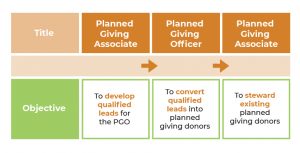You’ve decided to hire a Planned Giving Officer (PGO), and you’re looking for input on qualities, skills, and job description. We will get into that in a moment.
But first, Jeff and I want to congratulate you on your decision to add a role dedicated to this important fundraising function in your organization. Too many leaders and managers wait way too long to put a robust planned giving program in place. So, good for you for taking this bold step! You will not regret it.
Before I get started with the details related to hiring your PGO, I want to set up what we at Veritus believe is the ultimate destination for the division of labor and staffing for the planned giving function. When the PGO is assigned too many functions, the planned giving program will suffer. Keep this in mind as you begin your staffing process.
A fully functional planned giving program in a non-profit has three strategic operating areas. Each part is crucial to a productive planned giving system. The failure of any of these key functions will doom a program to be less productive than it should be. The three areas, managed by different people, is depicted in the graph that follows:

Notice the three functions:
- Develop Qualified Leads – Too many times Jeff and I see planned giving officers spending most of their time developing leads instead of closing them. This is not a good use of a PGO’s time. So, your goal, when the volume of leads can justify it, is to hire a planned giving associate who will perform this function. And note the word “qualified.” You do not want your PGO to pursue just any lead. You want leads that indicate a high inclination to become a planned giving donor. The good news is that the options available to generate leads – email-based surveys, social media marketing, and paid search – provide some really great options for qualifying leads.
- Convert Qualified Leads – This is the core work of a planned giving officer: showing qualified donor leads how they can invest in the work of the organization through a planned gift, asking them to make a commitment, and walking them through the process of creating a planned gift which addresses their interests, as well as their financial and estate concerns.
- Steward Planned Giving Donors – We got a huge education from our Director of Planned Giving Services, Robert Shafis, when he told us that 40-50% of planned givers change their minds and their wills before they pass. Why do they do this? There are several reasons, but the most important one for your organization is that they feel unconnected and forgotten by the charity they remembered in their plans. Sometimes another organization has convinced them to do it. You absolutely must invest in a position that stewards your existing planned giving donors.
So, this is your roadmap. Now you’re ready to move forward with hiring. And to help you find the right person for the role, here are the main characteristics of a great PGO:
- A person who knows how to relate to your donors and can motivate them about your mission (the person needs to be a good fundraiser, or at least have experience working with people in a sales context).
- Someone who can persuasively show the donors how planned giving works and why it is so important to the charity (note that this person doesn’t need to be a technician – 80-90% of all testamentary gifts come from simple will bequests and other revocable gifts).
- This person also needs to know how to hold the hand of a donor through this process of creating a planned gift and make sure they feel supported as they finalize their commitment.
The most important part of the hiring process is the interview, where you will be able to explore the candidate’s experience. Their resume is just a starting point; don’t ask them to repeat what is in it. Ask them for specific examples of when they have demonstrated each of the characteristics mentioned above, as well as the elements in the position description. The best indicator of future behavior is past behavior, so really dig into the person’s relevant fundraising experience. Not every good lawyer, financial planner, or insurance professional can be a good PGO.
And lastly, you can download the job description we recommend for hiring a Planned Giving Officer here.
As you are staffing up and budgeting for these efforts, please pay particular attention to the Planned Giving Associate (PGA) positions for lead generation and stewardship as they are very important functions in planned giving. When the volume of activity increases in lead generation, it will be important to hire a PGA to take the load off your PGO. Don’t for a minute think you can “save money” by not doing this. Believe me, it will pay off in your production and revenue.
And then, don’t forget to hire a second PGA to steward your existing planned giving donors. This is so critical to your financial future. Ignore this advice and be prepared to lose up to 50% of the planned giving commitments your donors have made. This is a lot of money, so make it a priority to hire for this position as soon as possible.
OK, there you have it. Everything you need to consider when you’re hiring a PGO. Let us know if we can help in any way. And get ready for a wonderful journey that will have many rewards!
Richard
Thank you to Robert Shafis, our Director of Planned Giving Services, who provided great insight and expertise for this blog.







0 Comments